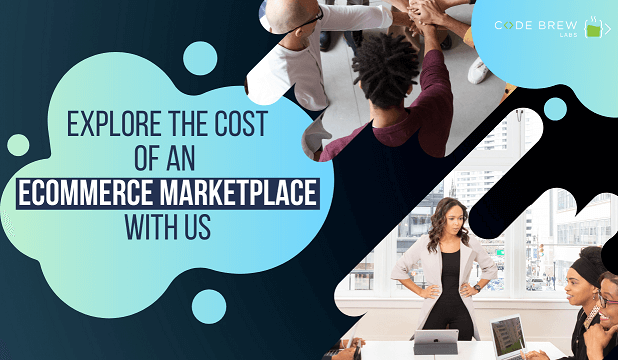
When talking about the most promising and successful business ideas of the present age, you can’t skip on an ecommerce marketplace. Its apparent reason is the seamless revenue generation cycle of Etsy, Amazon, eBay, and many other giants running worldwide.
In no time these ventures have turned out to be giant eCommerce marketplaces with customers in millions. Now, the fact that Amazon has up to 200 million users with net sales revenue worth 469.8 billion USD may sound enough to make you believe the former statement. Plus, eBay witnessed revenue growth of 14% last year.
All this makes the business world curious to be a part of the online business marketplace industry. And further, it pushes many entrepreneurs to find an answer to ‘how to launch an eCommerce app like eBay or Amazon.
If you hunting for the same, we have some must-to-read facts and insights for you. Today from discussing the cost to build an online marketplace to multiple features fluctuating its cost; we will unravel it all for you. All you need is to keep your eyes glued till the end. And we ensure you of getting a reliable app development roadmap ready in your head.
So, let’s get started!
But wait, let’s begin with a quick video giving you a sufficient overview of building an ecommerce marketplace.
An online marketplace is a virtual shopping platform connecting sellers and buyers. It comes with multiple features and functionalities adding to the user’s experience. It may interest you to know that such eCommerce marketplaces soon become a good source of branding. Plus the overall success rate of an online marketplace depends on its pre-defined structure, participants, and overall business model.
This makes it essential to understand the types of online marketplaces.
It’s essential to understand the nitty-gritty of its business model before hopping on the ecommerce marketplace cost-related parameters. Thus, a full-fledged business model will help you implement successive monetization strategies. Let’s explore them:
Wondering the difference between vertical and horizontal e-commerce marketplaces? Let’s get insights.
Horizontal marketplaces are all about delivering a wide range of services & products belonging to different categories. Therefore such eCommerce marketplaces can be referred to as a one-stop-shop. One of the biggest examples can be Amazon.
This one carries a completely different concept than the above one. Vertical marketplaces are known to sell products or services belonging to a specific category or niche. You can consider Airbnb as an appropriate example.
The global marketplaces are not restricted to specific geographical locations. Such platforms cover the complete exchange of goods and services beyond any geographical restrictions. Therefore it tends to target the target audience globally.
Etsy is one of the global marketplaces dealing in a series of vintage and handmade supplies sold worldwide. Here is a quick table to give you a clearer picture of the concept.
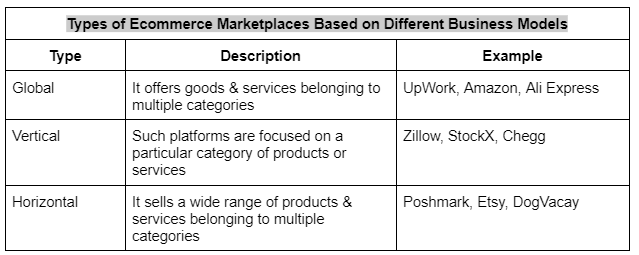
The best thing about online marketplaces is they can be segmented into different categories on the basis of participants involved. Generally, this encompasses
Such classification parameters are considered important to decide the overall cost of building an online marketplace.
B2C is a business-to-customer eCommerce model. It implies a thorough exchange of products or services between sellers and buyers. B2C mediums are more reliable on emotional responses of the brand as compared to the true value of products or services sold. One of the biggest examples of this marketplace can be Bonanza.
B2B is referred to as the business-to-business marketplace model. Here, the goods and services are exchanged between two or more businesses. This allows businesses to connect with different sellers and buyers at the same time. You can consider Alibaba Express as an appropriate example.
It’s a peer-to-peer marketplace that is often referred to as a multi-vendor virtual spot. These platforms work as a mediator among commercial people owning similar products or those who wish to purchase the same kind of goods or services. A P2P platform is all about sharing a series of products and services in one spot. Here, Uber can be seen as a perfect example.
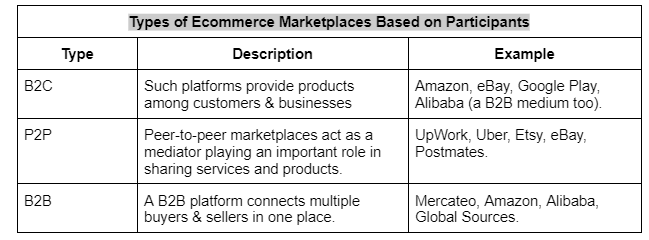
Now that we have explored what is an online marketplace and what are its different types. Let’s turn the page to how to begin building the best online marketplace to ensure the best success rate for your business.
Building an online marketplace comes with a deep understanding of the software, required functionalities, and much more. For this, you will need to choose from two options, including
Let’s discuss in-depth.
If you are one of those who can’t wait to have your hands on the best online marketplace, choose an off-the-shelf solution. No wonder most entrepreneurs run after ready-to-use software but as compared to the custom ones. Usually, this is to skip the hassle of the wireframe making, development, and testing phase.
On the contrary, an off-the-shelf solution may carry some drawbacks like-
Your desire of running a personalized online marketplace will only be fulfilled when you opt for a custom eCommerce marketplace development from point zero. It lets you have complete control over features & functionalities you wish to infuse.
Remember, a tailored solution demands better resources, which may accelerate the overall cost of an online marketplace website. But then the slog is going to reflect in the success rate indeed.
When dreaming of an eCommerce marketplace, you need to choose between hiring a:
Now you must be stuck somewhere at the ‘quality’ aspects. Well for that you should prefer outsourcing the first option (software development agency). The apparent reason is robust work exposure, a pool of professionals working on your project, timely delivery, and whatnot.
Coming to the remuneration factors, outsourcing a software development agency may cost you high but at the same time, you open gateways to professional development services. Additionally, the exact development charges may vary depending on the location. Where a developers’ team from the USA may charge you up to $100 per hour, you are likely to get similar services at lower prices from countries like India, China, etc.

Deciding on a robust technology stack directly reflects in reliable eCommerce marketplaces built. This is because different programming languages chosen decide the maintainability and overall performance of the software. A wrong choice can lead to poor page load speed or navigation issues forever.
Let’s take a deeper dig into this concept.
Backend development literally backs your product. Thus, it should be made sustainable. Generally, developers recommend Ruby on Rails, MySQL, Sidekiq, etc. to develop the server-side of the product.
It concerns the UI (user interface) adding high chances of better performance & product stability in the marketplace. Thus, the recommended technology stack for the frontend includes CSS3, React, HTML5, Vue.js., JavaScript, etc.
After the technology stack comes the line of features & functionalities of the online marketplace. This plays a crucial role in deciding the overall cost of the eCommerce marketplace platform for you. The simple mantra is –
more features = more price.
Thus put great emphasis on the features you require. To give you a fair idea of this concept, we have drafted a string of a few mandatory features to consider.
A piece of advice: Don’t forget to evaluate your business needs when deciding the features to include.
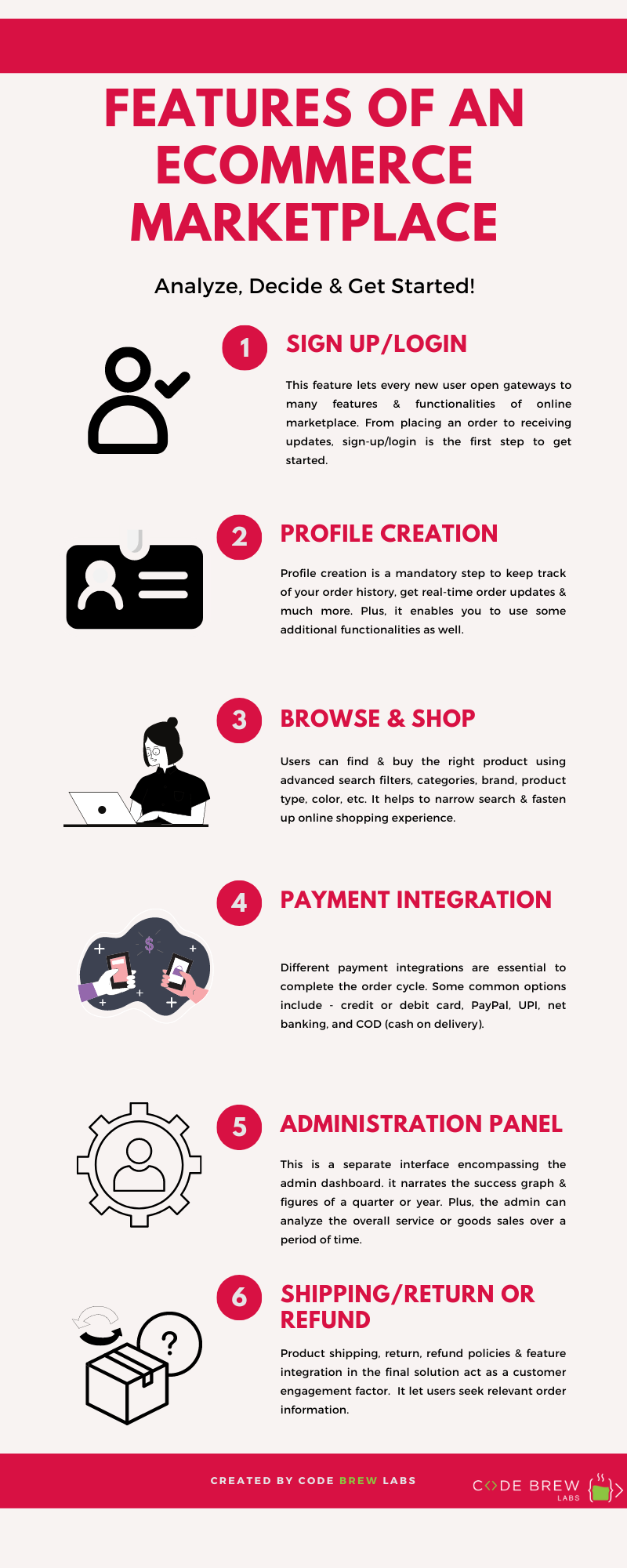
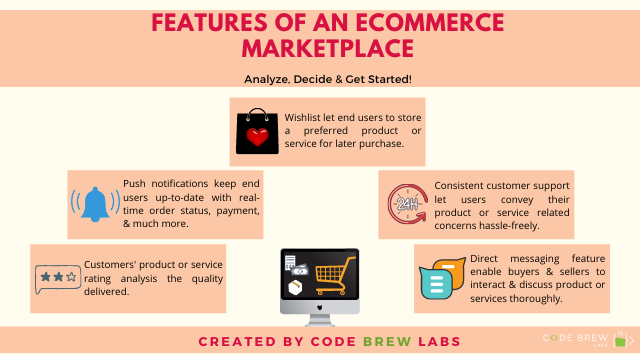
Let’s explore a breakdown of all factors adding to the online marketplace cost.
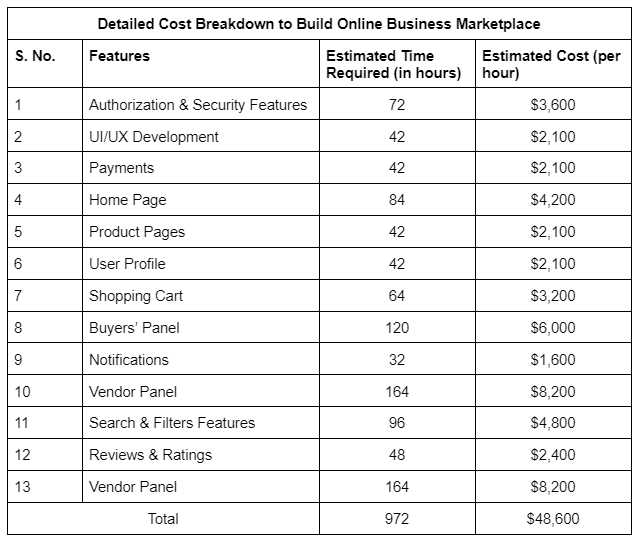
Believe it or not, professionals have the true potential to drive the required loyalty of their end customers. But here the challenge is how to find and outsource the best online marketplace development agency?
Maybe these factors will help you craft an appropriate screening process.
Remember, the ‘know-it-all’ strategy won’t work if you desire to have a full-proof working online business marketplace for you. This is because no one can be perfect in everything you demand. Thus, search for an agency putting multiple filters. What we mean is to narrow your search.
Hunt for agencies offering similar services or hold experience in the same. It will give you sufficient scope and reasons to make up your mind. Additionally, you will have an opportunity to look through their previous works.
Don’t drool over the work shown. Consider checking the market reputation as well. Here, we mean is to evaluate if the agency holds any certifications or recognition from the industry leaders.
Since the developers’ operational approach differs, clarify beforehand what workflow the agency prefers. Talking about the current market trends, most agencies and companies run agile methodology to achieve goals more appropriately. The overall operational approach can be judged on factors such as – work control, flexibility, effectiveness, time-saving thought process, etc.
Ensure that the agency consists of a quality analysts team along with experienced IT professionals to handle post-deployment maintenance hassle. Further, it can act as a reliable approach to waving off bugs, product quality issues while saving you a whopping amount.
If you fail to hear it from them, hear their brand advocates. Here, we are talking about client reviews. Thus, it can be considered as a straightforward and true way of seeking agency insights.
At Code Brew Labs, we have been developing online business marketplaces for multi-sized clients ranging from startups to Fortune 500 companies. Here, the major focal point remains on a product that tenfolds the business growth while proving as a legit asset for the client.
Moreover, we value your time thus have white-label applications and software ready for you in advance. So, all you need is to share your unique expectations and leave the rest on us. Furthermore, this has helped us save time for our esteemed clients and deliver a product meeting their expectations.
So, if you have got an online marketplace idea, we are here to turn it into reality. Let’s connect and brew a successful online marketplace for your venture.
The bottom line is –
The thought of building an online marketplace is likely to bring you down to the question ‘how much does it cost to build an online marketplace?’. Thus, you need insights about the required set of features & everything else contributing to the complete cost of a solution.
Starting off with the nitty-gritty of an eCommerce marketplace is likely to take you forward in the right direction. Still, if you feel like sticking somewhere, we are there to assist you!
Keep brewing great business ideas!
